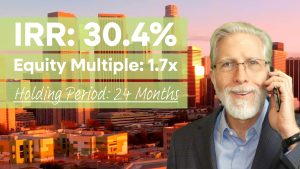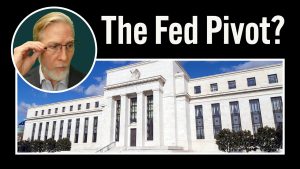Takeaways
- Investment activity in CRE will start to pick up in the second half of 2024.
- Distress in the market will result in bargain pricing for certain assets.
- Industrial, multi-family, and private credit are predicted to outperform.
“Compelling opportunities will emerge for commercial real estate investors in 2024, as high interest rates and an economic slowdown—perhaps even a mild recession—lead to bargain pricing for certain assets.” That’s one of the findings in a recently published report by CBRE, U.S. Real Estate Market Outlook 2024.
Picking up, but Slow-Going
They predict that investment activity in commercial real estate will finally start to pick up in the second half of 2024. However, don’t necessarily expect it to take off like a racehorse out of the chute at the Kentucky Derby. Ongoing economic uncertainty, geopolitical risks, and higher-for-longer interest rates will continue to weigh upon investor sentiment and, perhaps even more significantly, lender sentiment. The banking sector is all but assured of suffering losses due to decreased real estate values. In turn, that’s going to make them a lot more conservative about originating new loans for commercial real estate.
Loans in Negative Equity
To elaborate on lender sentiment, there’s an academic paper that has recently garnered a lot of attention in the banking industry. Written by four economists at the National Bureau of Economic Research, this paper finds that some 14% of all commercial real estate loans, including 44% of loans on office properties, are currently in negative equity. In other words, market values are currently less than loan balances. Given the wave of loan maturities coming due in 2024, this reality could put dozens, if not hundreds, of smaller, regional banks in jeopardy of collapsing. If we do end up in a significant recession in 2024, this will undoubtedly be the reason why. The title of the paper is Monetary Tightening, Commercial Real Estate Distress, and US Bank Fragility.
Opportunities in a Distressed Market
Back to the CBRE report, their point is that distress in the commercial real estate market and the growing inability of certain borrowers to refinance their properties is going to result in remarkable opportunities for all-cash buyers. By their estimate, cap rates for commercial real estate, exclusive of office properties, have increased by roughly 150 basis points during the period of time that the Fed has been engaged in restrictive monetary policy. Office properties have fared even worse. In addition to interest rate hikes, the normalization of hybrid work policies has proven devastating to demand for this property type. Cap rates for office properties have risen by at least 200 basis points during the same period of time. What’s more, going into 2024, CBRE predicts that cap rates for most property types will likely continue to increase by another 25 to 50 basis points, before eventually stabilizing in the second half of the year.
Ideal Time to Acquire Investment Properties
If you’re looking to acquire investment properties at or even below the trough, you’ll need to find them in 2024. CBRE pegs multi-family and industrial as the property types of choice, citing relatively strong fundamentals and long-term tailwinds. Although rent growth for multi-family is expected to decelerate over the next couple of years due to an historic delivery of new units to the market, oversupply is expected to be short-lived and renter demand should remain sufficient over a longer-term holding period, providing attractive returns for investors.
Debt Investments to Outperform
In addition to these opportunities, the report also notes that large amounts of capital have been raised in the private credit market for opportunistic debt investments. This ties in with my earlier comments about banks and other traditional lenders growing more conservative. The term loans they originated just a few years ago will no longer fit in their credit boxes. As those loans come due in 2024, banks are not going to be enthusiastic about refinancing them, which is going to be problematic for borrowers.
As banks retreat from the commercial real estate market, private credit funds and other alternative lenders are ready to deploy record levels of capital. As a matter of fact, they’ve been growing their market share of commercial real estate loans for years, significantly since the Great Recession. That growth, however, is very much about to accelerate. My personal opinion is that we’re entering a transitory period of time when real estate debt investments are generally expected to outperform real estate equity investments.
Read the CBRE report, U.S. Real Estate Market Outlook 2024, on their website. It’s available at this URL: https://www.cbre.com/insights/books/us-real-estate-market-outlook-2024/
Download the NBER paper, Monetary Tightening, Commercial Real Estate Distress, and US Bank Fragility, as a PDF from the following link: https://www.nber.org/system/files/working_papers/w31970/w31970.pdf




















